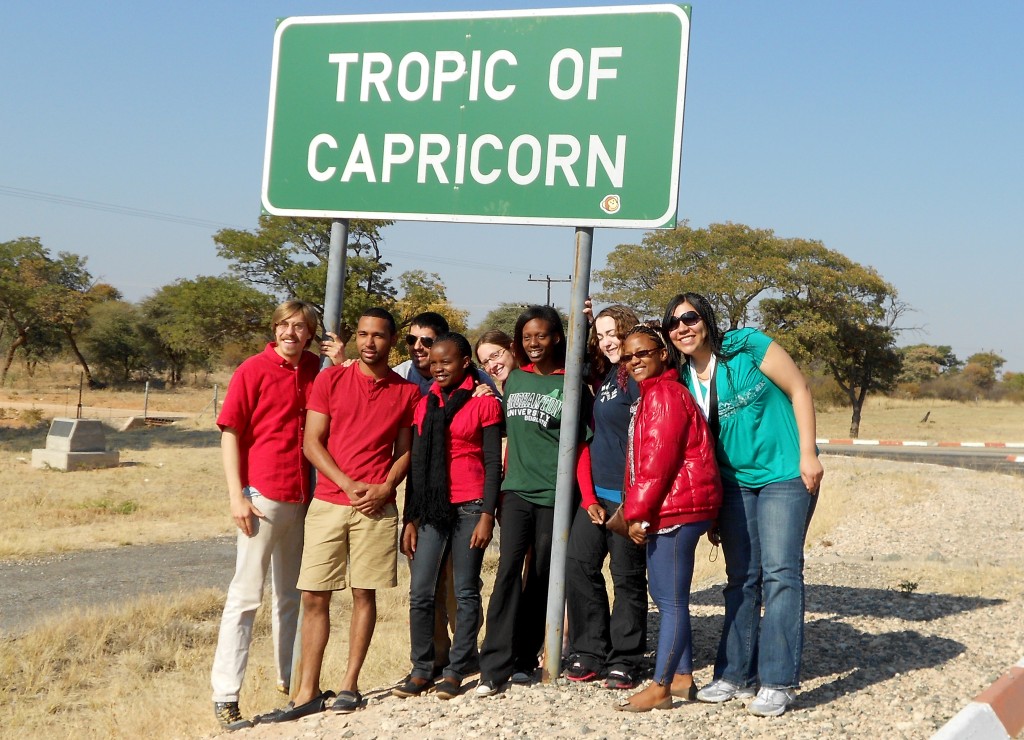
Binghamton University added another nation to its study abroad repertoire this summer as four professors and 14 students ventured across the globe to the small, south African country of Botswana.
Botswana has a population of about 2 million. It is known mostly for its diamond and beef exports, its beautiful game reserves and its high HIV and AIDS prevalence rates.
The seeds of the BU-Botswana program were planted in 2008 when Thando Gwebu, a professor at University of Botswana (UB), served as a visiting scholar in the geography department at BU. Before then, professor Norah Henry, chair of the geography department, and John Frazier, a professor of geography, both knew Gwebo from their time together in graduate school. Henry said it had long been their intention to form an exchange program between the two universities.
“Dr. Gwebu, Dr. Frazier and Dr. Henry developed a Memorandum of Understanding between the University of Botswana and Binghamton University and worked with Dr. Katharine Krebs of the Office of International Programs to refine the document that was approved by the senior administration of both Binghamton and Botswana,” Henry wrote in an email.
In 2011, faculty from the BU geography department, along with Krebs, visited Botswana to meet with UB geography faculty and administrators to assess the possibility of collaborative teaching and research.
The BU students on the trip this summer, along with four students from UB, took comparative geography classes together that focused on urbanization and health issues in Botswana and the United States, and the students went on field trips to experience these differences firsthand.
“The field trips especially emphasized the differences between the U.S. and Botswana with respect to distances, urban development and services available to the population,” Henry said.
Students went on field trips to Palapye, Serowe and Francistown, where they heard lectures from local officials. The also visited the Kgalagadi Transfrontier Park in the Kalahari Desert and Moremi Game Reserve in the Okavango Delta, where students went on game drives.
Throughout their time in Botswana this summer, students blogged about their experiences on the official program website.
Sara Zubalsky, a graduate student in the geography department, wrote that she particularly enjoyed her time at the Berry Bush Lodge in Tsabong, located in the Kalahari Desert.
“I was determined to learn the story of our hostess at Berry Bush and during the lull between our arrival from the Kalahari and dinner, I found her to be more than obliging in sharing her life with me,” Zubalsky wrote. “She went beyond her own history to share and pass on her passion for the San and their medicinal plants to me. The genuineness of her story and love for the desert and all its inhabitants gave the Kalahari a voice and heartbeat I won’t soon forget.”
Thomas McElhenney, a graduate student in the geography department, blogged about attending the 2014 FIFA World Cup Brazil Qualifier between Botswana and South Africa, held in UB’s sports stadium in Gaborone.
“You should have seen the place,” McElhenney wrote. “The stadium was small, it probably could only hold 10,000 people or less, so it was packed. Everyone one was really into it; some walk around in zebra outfits — that’s the national animal — others had the team’s blue and white colors and put a pillow or ball in their stomach and walk around bouncing their stomach and dancing … The people are the entertainment, not the scoreboard which is so typical in the United States.”
Henry said the geography department intends to create an annual trip to Botswana with course content built around faculty research interests.
“Field trips and preliminary lectures will likely remain the same, but focused research in various parts of the country will form the main activities,” Henry said.
Jillian Shotwell, a junior majoring in environmental health, said the trip had a great impact on her.
“We all expected to learn a great deal from our trip to Botswana, but I never expected to take back with me all that I did,” Shotwell said. “I learned to see the effect and fight against HIV/AIDS in an entirely different light and not as solely a statistic or television program.”


